[bannerTop]
Welcome to our Npasre Virus removal guide. The following instructions will aid you in removing the unwanted software from your PC.
Something that many users get frustrated by is a type of program known as Browser Hijacker. Today’s article will revolve around one particular Hijacker program known under the name of Npasre Virus. If you currently have that on your PC, then you have probably noticed various changes to your Chrome, Internet Explorer or Mozilla Firefox browser. For example, the previous homepage of the browser might have been changed to some unknown website or the default search engine may have been replaced with another one that you have never heard of before. Additionally, it is possible that ever since the Hijacker got installed onto your PC, your browser has started to experience frequent page redirects to random websites that you do not want to visit. If this is your situation, then you are probably looking for a way to bring things back to normal and prevent the unpleasant program from messing with your browser and internet settings. Here, you can learn how to uninstall and fully remove Npasre Virus but before we show you our guide manual that will help you do that, we must first provide you with some additional info regarding Browser Hijackers.
What’s the purpose of a Hijacker?
At first sight, many programs that can be categorized as Browser Hijackers seem to provide the user with some sort of helpful function. For example, some of those programs are promoted as improving one’s browsing experience or making the the computer safer and better protected. Others might be marketed as PC optimization tools that are supposed to enhance the overall computer performance. However, the truth is that the majority of Browser Hijackers have one single purpose – to profit their developers through the employment of a variety of aggressive advertising methods. This is why your browser gets partially taken out of your control and why there might be page redirects. Surely, there are programs that can be regarded as Hijackers that can still be beneficial to the regular customer but you should keep in mind that for the most part this is not the case.
Malware
Many experts seem to refer to programs the likes of Npasre Virus as malware due to the intrusive and obstructive behavior that most Browser Hijackers display. However, a distinction needs to be made between software of the Hijacker type and actual harmful PC viruses (Trojans, Ransomware, Spyware, etc.). Most Hijackers are not supposed to harm one’s computer or mess with the data that is stored on it. In addition to that, it should be noted that many programs similar to Npasre Virus are in fact legal and some of them are even developed by big and popular software companies. Still, there remains the question “Are Hijackers harmful?”, and we will answer it in our next paragraph.
Potential harm
While Npasre Virus is probably incapable of causing any actual damage to your system or files, it might still potentially compromise the security of your system. For instance, the page redirects that might occur could potentially open various shady websites with a bad reputation. In addition to that, Hijackers are also known to modify or add Registry keys, which can make your PC more vulnerable to virus attacks. Some programs of this type could also generate and display fake warnings or web-offers that are there to trick you into purchasing some obscure piece of software with questionable functionality. All in all, there is no shortage of potential issues that one might have with a Hijacker program. Therefore, if you want to avoid landing any more unpleasant programs and also keep your machine protected against potential attacks from malicious viruses such as Ransomware or Trojan horses, you should probably remove Npasre Virus from your machine.
Guidelines for better security
In order to ensure that potentially unwanted programs like Npasre Virus do not get installed on your computer in the future, you must remember and apply a couple of important rules that will help you improve the overall security of your PC.
- Try to avoid websites that have a lot of shady-looking ads or that redirect you to other pages when you click on something. Oftentimes such websites can land you some unpleasant piece of software.
- If you receive an e-mail or Facebook/Skype message that contains a web-link or a file attachment, do not interact with the contents of the message unless you are absolutely sure that the link/file is safe to open.
- If you want to install a new program, first look through its setup menu and see if there are any applications bundled with that program. If there’s anything added and you are not sure whether it is safe, look it up and if you do not find anything about it or if it turns out to be a potentially unwanted piece of software, uncheck it from the installer before you launch the installation of the main program.
- Having some form of security software on your PC is a good idea if you want to avoid unwanted programs like Browser Hijackers. A good anti-malware tool can greatly help you in the fight against Hijackers, which is why it is always a good idea to have one such program installed on your PC.
SUMMARY:
| Name | Npasre Virus |
| Type | Adware/Browser Hijacker |
| Danger Level | Medium (nowhere near threats like Ransomware, but still a security risk) |
| Symptoms | Unwanted changes to the user’s browser is the most common symptom. |
| Distribution Method | Different types of spam, misleading Internet offers and adverts, file-bundles. |
Npasre Virus Removal
I – Safe mode and revealing hidden files
II – Uninstallation
[bannerMiddle]
- Use the Winkey+R keyboard combination, write Control Panel in the search field and hit enter.

- Go to Uninstall a program under Programs.

- Seek the unwanted software, select it and then click on Uninstall
If you are unable to spot Npasre Virus, search for any unrecognized programs that you do not remember installing on your PC – the unwanted software might disguise itself by going under a different name.
III – Cleaning all your browsers
- Go to your browser’s icon, right-click on it and select Properties.

- Go to the Shortcut tab and in the Target make sure to delete anything written after “.exe”.

- Now, open your browser and follow the instructions below depending on whether you are using Chrome, Mozilla or IE.
- Chrome users:
- Go to your browser’s main menu located in the top-right corner of the screen and select Settings.
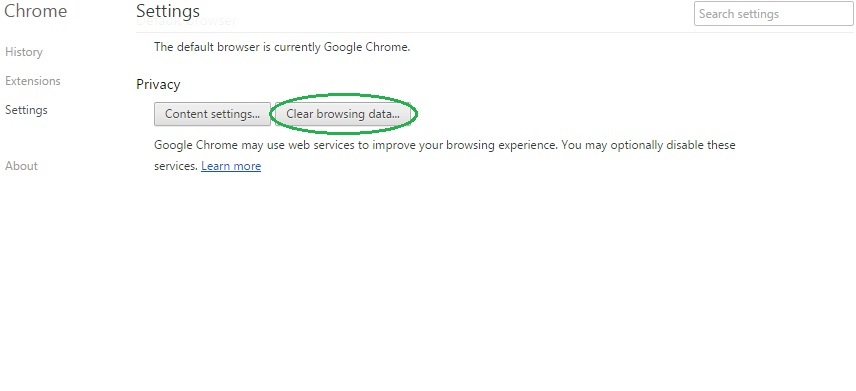
- Scroll down, click on Show Advanced Settings and then select Clear browsing data. Just to be sure, tick everything and clear the data.
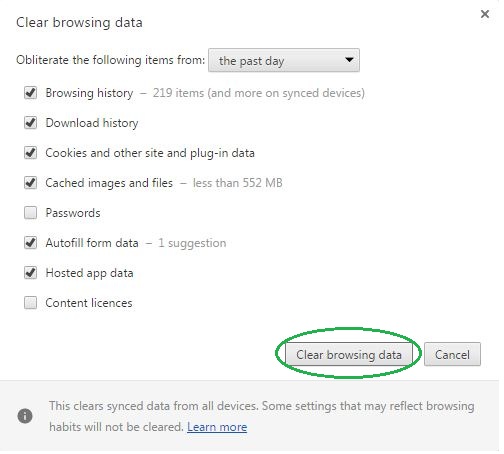
- Now, in the left pane, go to Extensions and look through all extensions that are integrated within your browser. If you notice any suspicious add-on, disable it and then remove it.
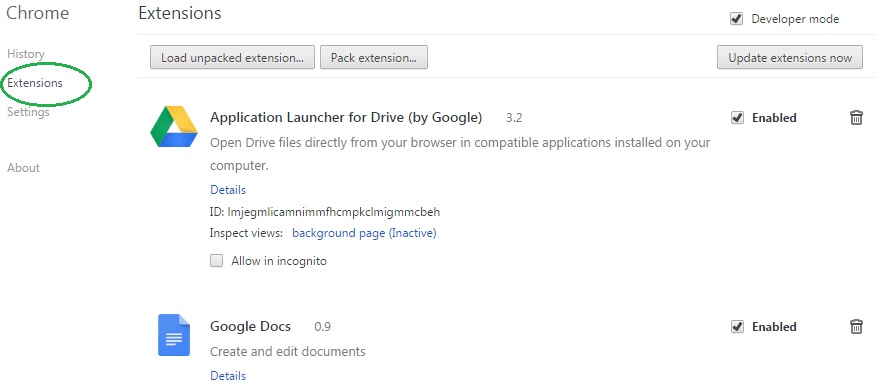
- Firefox users:
- Similarly to Chrome, go to the main menu and select Add-ons and then Extensions.
- Remove any suspicious browser extensions that you may have even if they do not have the name Npasre Virus on them.
- IE users:
- Go to Tools and select Manage add-ons.

- Click on all add-on types from the left pane and check if there is anything suspicious in the right panel. In case you find anything shade, make sure to remove it.
IV – Removing Shady processes
[bannerMiddleSecond]
- Go to your start menu, type Task Manager in the search field and from the results open View running processes with Task Manager.

- Thoroughly look through all processes. The name Npasre Virus might not be there, but if you notice any shady looking process that consumes high amounts of memory it might be ran by the unwanted program.
- If you spot the process ran by Npasre Virus, right-click on it, open its file location and delete everything in there. Then go back to the Task Manager and end the process.

V – DNS check
- In the start menu search box write View Network Connections and open the first result.
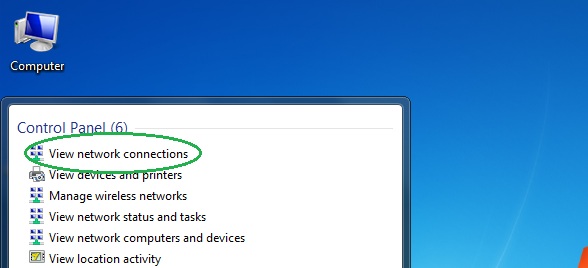
- Right-click on the network connection you are using and go to Properties.

- Select Internet Protocol Version (TCP/IPv4) and click on Properties.

- If Obtain DNS server addresses automatically is not checked, check it.
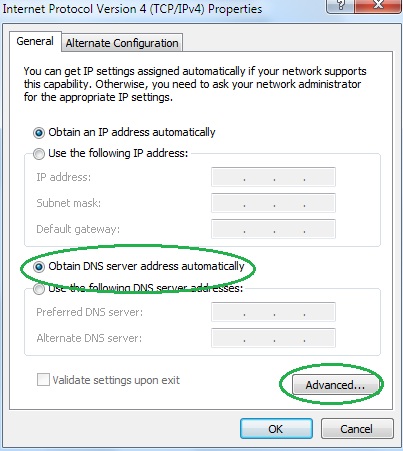
- Go to Advanced and select the DNS If there is anything in the DNS server addresses field, remove it and click OK.

- Click OK on the rest of the opened windows.






Leave a Reply